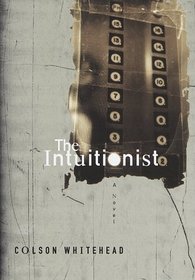Helpful Score: 1
This book's greatest flaw is its complexity, both in subject and in style. Whitehead uses the backdrop of simple, pulp, boiled-down noir fiction to present a rather intricate metaphor on race, using elevators to demonstrate it. I found myself distracted by the metaphorwhat did he mean? In order to raise something (someone?), there had to be a counterweight involvedsomething (someone) must be forced down. What did he mean by Intuition vs. Empiricism? How on Earth would Intuition ever be accepted as a realistic way to inspect elevators? Wouldn't you actually have to look at them? What about the philosophical history of Empiricismshould I consider that at all? So distracted was I with solving this puzzle of a plot with all sorts of characters who weren't what they seemed that I couldn't enjoy the story. It's like being so set on figuring out a Rubik's Cube that you forget that it's supposed to be fun and end up returning it back to the box in the garage.
Then, also, Whitehead is crazy amazing with language and wrote so beautifully and elegantly that I again became distracted, trying to dissect his sentences. The way this man uses the English language astounds me. His observations so keen and seamless; they all gave me pause and slowed my reading down considerably.
The payoff comes at the very end for everyone confused or unsure of the metaphor; it all makes sense and you think, "Oh. I had it all along." I prefer Apex Hides the Hurt to this one, but this wasn't a bad read at all. Whitehead is a writer that will be mentioned in books far after we're gone. He's that good.
Then, also, Whitehead is crazy amazing with language and wrote so beautifully and elegantly that I again became distracted, trying to dissect his sentences. The way this man uses the English language astounds me. His observations so keen and seamless; they all gave me pause and slowed my reading down considerably.
The payoff comes at the very end for everyone confused or unsure of the metaphor; it all makes sense and you think, "Oh. I had it all along." I prefer Apex Hides the Hurt to this one, but this wasn't a bad read at all. Whitehead is a writer that will be mentioned in books far after we're gone. He's that good.
Helpful Score: 1
I wanted to enjoy this book, all of the reviews I've read said I should, but after slogging through two discs and constantly having to back track because my mind had drifted away I'm calling it quits. It's about an elevator inspector, political ambitions, discrimination and it's also a mystery but the storytelling (and the audio narrator) are so dry and slow that I can't bear to listen to any more of it. I've got too many others in the queue to waste any more time struggling to get into this one.




